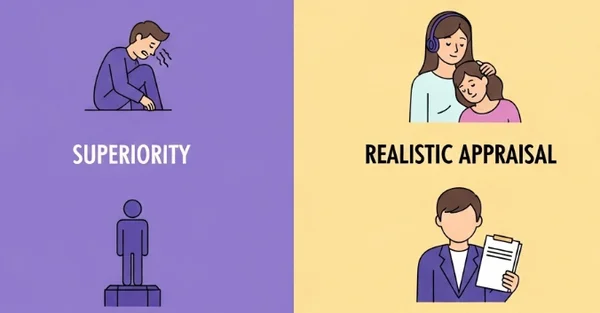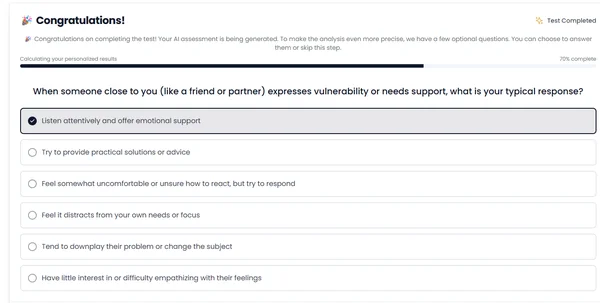ความหลงตัวเองหรือความภาคภูมิใจในตนเอง: ความแตกต่างที่สำคัญ
June 15, 2025 | By Rowan Thorne
ความมั่นใจเป็นคุณสมบัติที่น่ายกย่อง แต่ ความมั่นใจบ่งบอกถึงความหลงตัวเองหรือไม่? เป็นคำถามที่พบบ่อย เนื่องจากเส้นแบ่งระหว่าง ความมั่นใจที่ดีต่อสุขภาพ กับลักษณะหลงตัวเองที่ไม่ดีต่อสุขภาพนั้นบางครั้งดูเหมือนจะพร่ามัว การทำความเข้าใจความแตกต่างที่สำคัญในประเด็น ความหลงตัวเอง vs ความภาคภูมิใจในตนเอง เป็นสิ่งสำคัญอย่างยิ่งสำหรับการรับรู้ตนเองที่ถูกต้องและการส่งเสริมความสัมพันธ์ที่ดีต่อสุขภาพ คู่มือนี้จะช่วยให้คุณเข้าใจความแตกต่างที่สำคัญผ่านการวิเคราะห์เปรียบเทียบ โดยเน้นที่ด้านต่างๆ เช่น ความสามารถในการเอาใจใส่ และ วิธีรับมือกับคำวิจารณ์ ในขณะที่สำรวจแนวคิดเหล่านี้ หากคุณอยากรู้เกี่ยวกับลักษณะหลงตัวเองที่เฉพาะเจาะจง แบบทดสอบความหลงตัวเอง ของเราสามารถเป็นจุดเริ่มต้นสำหรับการไตร่ตรอง
การทำความเข้าใจความภาคภูมิใจในตนเองที่ดี: รากฐานสู่สุขภาวะ
ก่อนที่จะเปรียบเทียบ สิ่งสำคัญคือต้องเข้าใจว่าอะไรคือ ความภาคภูมิใจในตนเองที่ดี มันเป็นมากกว่าแค่รู้สึกดีกับตัวเอง มันคือความซาบซึ้งที่สมดุลและสมจริงในคุณค่าและความสามารถของตนเอง ความภาคภูมิใจในตนเองสูงมีลักษณะอย่างไร ที่แยกความแตกต่างจากลักษณะที่เป็นปัญหา
องค์ประกอบสำคัญของความภาคภูมิใจในตนเองที่แท้จริง
ความภาคภูมิใจในตนเอง ที่แท้จริงซึ่งเป็นรากฐานของ ความมั่นใจที่ดีต่อสุขภาพ โดยทั่วไปแล้วเป็นสิ่งที่อยู่ภายใน มันเกี่ยวข้องกับ:
- มุมมองที่เป็นจริงและยอมรับได้เกี่ยวกับตนเอง โดยยอมรับทั้งจุดแข็งและจุดอ่อน
- ความรู้สึกถึงคุณค่าโดยธรรมชาติที่ไม่ขึ้นอยู่กับความสำเร็จภายนอกหรือการอนุมัติจากผู้อื่นเท่านั้น
- ความสามารถในการปฏิบัติต่อตนเองด้วยความเห็นอกเห็นใจและเคารพ แม้ในยามที่เผชิญกับความพ่ายแพ้ รากฐานภายในนี้ช่วยเสริมสร้าง ความยืดหยุ่น
สัญญาณของความภาคภูมิใจในตนเองสูงในชีวิตประจำวัน
บุคคลที่มี ความมั่นใจที่ดีต่อสุขภาพ และความภาคภูมิใจในตนเองที่แข็งแกร่งมักแสดง สัญญาณของความภาคภูมิใจในตนเองสูง ดังต่อไปนี้:
-
พวกเขาสามารถยอมรับคำติชมที่สร้างสรรค์และเรียนรู้จากความผิดพลาดได้โดยไม่ทำให้ภาพลักษณ์ของตนเองพังทลาย
-
พวกเขาสามารถยินดีกับความสำเร็จของผู้อื่นได้ โดยไม่รู้สึกด้อยค่า
-
พวกเขามักจะมีความสัมพันธ์ที่มั่นคงและเป็นไปในลักษณะต่างตอบแทนมากขึ้น
-
พวกเขาแสดงให้เห็นถึง ความยืดหยุ่น ในการฟื้นตัวจากความยากลำบาก
-
โดยทั่วไปพวกเขามีทักษะด้านมนุษยสัมพันธ์ที่ดีและ ความฉลาดทางอารมณ์

ทำความเข้าใจรูปแบบของคนหลงตัวเอง: มากกว่าแค่ความมั่นใจ
ในขณะที่บุคคลที่หลงตัวเองบางคนสามารถฉายภาพลักษณ์ของความมั่นใจอย่างมากได้ แต่สิ่งนี้มักจะปิดบังความเป็นจริงภายในที่แตกต่างกัน การทำความเข้าใจ รูปแบบของคนหลงตัวเอง เหล่านี้เป็นกุญแจสำคัญในการแยกแยะ ความหลงตัวเอง vs ความภาคภูมิใจในตนเอง
เบื้องหลังความยิ่งใหญ่ของคนหลงตัวเอง: อัตตาที่เปราะบาง
"ความมั่นใจ" ที่ปรากฏในรูปแบบการนำเสนอความหลงตัวเองหลายรูปแบบ มักเป็นการแสดงออกถึง ความยิ่งใหญ่ ที่สร้างขึ้นจาก ความแข็งแกร่งของอัตตา ที่เปราะบาง การแสดงออกภายนอกนี้ทำหน้าที่ปกป้องตนเองภายในที่อ่อนแอจากภัยคุกคามที่รับรู้หรือความรู้สึกไม่เพียงพอ ซึ่งแตกต่างจากความภาคภูมิใจในตนเองที่แท้จริง "ความมั่นใจ" นี้ขึ้นอยู่กับการยอมรับจากภายนอกอย่างมาก คุณสามารถสำรวจลักษณะของคนหลงตัวเองทั่วไปเพิ่มเติมได้ในบทความของเรา: [Planned Article Title - ฉันเป็นคนหลงตัวเองหรือไม่? 10 สัญญาณและลักษณะทั่วไป]
ลักษณะของคนหลงตัวเองที่สำคัญที่มักเข้าใจผิดว่าเป็นความมั่นใจ
ลักษณะของคนหลงตัวเอง หลายประการสามารถเข้าใจผิดได้ง่ายว่าเป็นความภาคภูมิใจในตนเองที่แข็งแกร่ง:
-
การให้ความสำคัญกับตนเองมากเกินไป: ในขณะที่การตระหนักรู้ในตนเองเป็นสิ่งที่ดี การหมกมุ่นอยู่กับตนเองมากเกินไปอาจเป็นสัญญาณของความหลงตัวเอง
-
ความรู้สึกว่าตนเองเหนือกว่า/การมีสิทธิพิเศษ: การเชื่อว่าตนเองดีกว่าโดยธรรมชาติหรือสมควรได้รับการปฏิบัติเป็นพิเศษ ซึ่งแตกต่างจากความมั่นใจที่ได้รับมา
-
การมองข้ามผู้อื่น: แนวโน้มที่จะลดคุณค่าหรือดูถูกผู้อื่นเพื่อยกระดับตนเอง แทนที่จะเป็นความมั่นใจในตนเองที่แท้จริงที่ไม่จำเป็นต้องลดทอนผู้อื่น

ความหลงตัวเอง vs ความภาคภูมิใจในตนเอง: จุดเปรียบเทียบที่สำคัญ
มาเปรียบเทียบ ความหลงตัวเอง vs ความภาคภูมิใจในตนเอง โดยตรงในหลายมิติที่สำคัญเพื่อเน้นความแตกต่างพื้นฐาน อะไรคือความแตกต่างระหว่างความหลงตัวเองกับความภาคภูมิใจในตนเอง เมื่อเราพิจารณาอย่างใกล้ชิด
แหล่งที่มาของความภาคภูมิใจในตนเอง: การยอมรับจากภายใน vs ภายนอก
- ความภาคภูมิใจในตนเองที่ดี: ได้รับ ความภาคภูมิใจในตนเอง เป็นหลักจากแหล่งภายใน - ทักษะ ค่านิยม และการยอมรับตนเอง ในขณะที่ความสำเร็จภายนอกได้รับการชื่นชม แต่ไม่ใช่ปัจจัยกำหนดคุณค่าในตนเองเพียงอย่างเดียว
- ความหลงตัวเอง: อาศัยการยอมรับจากภายนอกอย่างมาก - ความชื่นชม การยกย่อง สถานะ และความสนใจจากผู้อื่น - เพื่อรักษาสัมผัสแห่งตนเอง หากปราศจากสิ่งนี้ การรับรู้ตนเองของพวกเขาก็อาจพังทลายได้
ความสามารถในการเอาใจใส่: การเชื่อมต่อกับผู้อื่น vs การให้ความสำคัญกับตนเอง
- ความภาคภูมิใจในตนเองที่ดี: โดยทั่วไปบุคคลจะมีความสามารถในการเข้าใจผู้อื่นที่ดี ทำให้พวกเขาสามารถเข้าใจ แบ่งปัน และตอบสนองต่อความรู้สึกของผู้อื่นได้อย่างเหมาะสม ส่งเสริมการเชื่อมต่อที่แท้จริง
- ความหลงตัวเอง: มีลักษณะเฉพาะคือการขาดหรือความบกพร่องที่สำคัญของความเห็นอกเห็นใจ การมุ่งเน้นจะอยู่ที่ความต้องการและความรู้สึกของตนเองเป็นหลัก ทำให้ยากที่จะเชื่อมต่อหรือพิจารณาสถานะทางอารมณ์ของผู้อื่นอย่างแท้จริง นี่คือตัวแยกความแตกต่างที่สำคัญจาก ความมั่นใจที่ดีต่อสุขภาพ
การตอบสนองต่อคำวิจารณ์: โอกาสในการเติบโต vs การโจมตีส่วนตัว (วิธีรับมือกับคำวิจารณ์)
- ความภาคภูมิใจในตนเองที่ดี: ในขณะที่ไม่มีใครชอบคำวิจารณ์ ผู้ที่มีความภาคภูมิใจในตนเองที่ดีมักจะสามารถประมวลผล คำติชมที่สร้างสรรค์ มองว่าเป็นโอกาสในการเติบโต และแยกออกจากความภาคภูมิใจในตนเองโดยรวมของพวกเขา วิธีรับมือกับคำวิจารณ์ของพวกเขามักจะอยู่ในระดับที่พอเหมาะ
- ความหลงตัวเอง: บุคคลมักแสดงวิธีรับมือกับคำวิจารณ์ที่รุนแรง โดยรับรู้ว่าคำติชมเชิงลบใดๆ (หรือแม้แต่ข้อสังเกตที่เป็นกลาง) เป็นการโจมตีส่วนตัวหรือภัยคุกคามต่อภาพลักษณ์ที่ยิ่งใหญ่ของตนเอง สิ่งนี้อาจนำไปสู่การป้องกัน ความโกรธ หรือการปฏิเสธ
ความสัมพันธ์: ความเคารพซึ่งกันและกัน vs การแสวงหาผลประโยชน์หรือการลดคุณค่า
- ความภาคภูมิใจในตนเองที่ดี: ส่งเสริมความสัมพันธ์บนพื้นฐานของความเคารพซึ่งกันและกัน การแลกเปลี่ยนซึ่งกันและกัน และการดูแลอย่างแท้จริง พวกเขาให้คุณค่ากับผู้อื่นและสามารถรักษาความสัมพันธ์ที่เท่าเทียมกันได้
- ความหลงตัวเอง: ความสัมพันธ์มักมีลักษณะเฉพาะคือความต้องการที่จะครอบงำ ควบคุม หรือเอารัดเอาเปรียบ ผู้อื่นอาจถูกมองว่าเป็นส่วนขยายของตนเองหรือเป็นแหล่งอุปทานของความหลงตัวเอง นำไปสู่การลดคุณค่าหรือสิทธิ์ภายในปฏิสัมพันธ์
ความยืดหยุ่นและการจัดการกับความพ่ายแพ้: การฟื้นตัว vs ความเปราะบาง
- ความภาคภูมิใจในตนเองที่ดี: เอื้อต่อ ความยืดหยุ่น ที่มากขึ้น โดยทั่วไปบุคคลสามารถรับมือกับความพ่ายแพ้ เรียนรู้จากความล้มเหลว และรักษาสัมผัสแห่งตนเองที่มั่นคง
- ความหลงตัวเอง: แม้จะแสดงออกถึงความแข็งแกร่งภายนอก แต่ก็มักมีความเปราะบางอยู่ภายใน ความพ่ายแพ้หรือความล้มเหลวอาจเป็นสิ่งที่เจ็บปวดอย่างมาก นำไปสู่ปฏิกิริยาที่ไม่สมส่วนหรือการล่มสลายของการรับรู้ตนเองที่พองโต
เป็นไปได้หรือไม่ที่เราจะมีความมั่นใจมากเกินไป โดยที่ไม่เป็นคนหลงตัวเอง?
นี่เป็นคำถามที่ละเอียดอ่อน เป็นไปได้ไหมที่ใครบางคนจะมั่นใจเกินไปโดยไม่เป็นคนหลงตัวเอง? เป็นไปได้ อย่างไรก็ตาม เป็นไปได้เช่นกันที่บุคคลจะมีพื้นฐานของทักษะที่แท้จริง (อาจเฉพาะสถานการณ์) และ ความมั่นใจที่ดีต่อสุขภาพ ในขณะที่ ยัง แสดงลักษณะของคนหลงตัวเองบางอย่าง ปัจจัยที่สำคัญคือลักษณะหลงตัวเองเหล่านั้นแพร่หลาย บั่นทอน และส่งผลเสียต่อผู้อื่นหรือไม่ (เช่น ขาดความเห็นอกเห็นใจ ชอบแสวงหาผลประโยชน์) ความภาคภูมิใจในตนเองที่แท้จริงและดีไม่ได้สร้างขึ้นจากการลดคุณค่าผู้อื่นหรือความต้องการอย่างต่อเนื่องสำหรับการยกย่องจากภายนอก

การใช้แบบทดสอบความหลงตัวเองเพื่อความชัดเจนเกี่ยวกับลักษณะ (ไม่ใช่ความภาคภูมิใจในตนเอง)
แบบทดสอบความหลงตัวเอง ออนไลน์ส่วนใหญ่จะประเมินระดับของลักษณะหลงตัวเองที่บุคคลอาจมี ไม่ได้วัดความภาคภูมิใจในตนเองโดยตรง แม้ว่าทั้งสองแนวคิดจะเกี่ยวข้องกัน (มักจะตรงกันข้ามในกรณีของความหลงตัวเองที่เปราะบาง หรือพองโตอย่างผิวเผินในความหลงตัวเองที่ยิ่งใหญ่) การทำความเข้าใจระดับลักษณะหลงตัวเองของคุณสามารถให้บริบทได้ หากลักษณะดังกล่าวอยู่ในระดับต่ำ ความมั่นใจของคุณมีแนวโน้มที่จะหยั่งรากลึกในความภาคภูมิใจในตนเองที่ดี หากลักษณะดังกล่าวอยู่ในระดับสูง ควรตรวจสอบว่า "ความมั่นใจ" ของคุณอาจสอดคล้องกับรูปแบบความหลงตัวเองมากกว่าหรือไม่ แบบทดสอบความหลงตัวเองออนไลน์ฟรี ของเราสามารถเป็นเครื่องมือหนึ่งในการเดินทาง การรับรู้ตนเอง ของคุณ แต่โปรดจำไว้ว่าจุดประสงค์ของมันคือข้อมูลเชิงลึก ไม่ใช่การวินิจฉัย

การปลูกฝังความภาคภูมิใจในตนเองที่ดีในขณะที่รับรู้ถึงสัญญาณของความหลงตัวเอง
การแยกแยะระหว่าง ความหลงตัวเอง vs ความภาคภูมิใจในตนเอง เป็นสิ่งสำคัญสำหรับการเติบโตส่วนบุคคลและการส่งเสริมความสัมพันธ์ที่ดีต่อสุขภาพ เป็นความจริงที่ว่า ความมั่นใจที่ดีต่อสุขภาพ สร้างขึ้นจากการยอมรับตนเอง ความยืดหยุ่น และความเห็นอกเห็นใจ ในขณะที่รูปแบบความหลงตัวเองมักเกิดจากความไม่มั่นคงและความต้องการที่จะยกระดับตนเองโดยเสียค่าใช้จ่ายของผู้อื่น การตระหนักถึงความแตกต่างเหล่านี้ รวมถึงความสามารถในการเอาใจใส่ และรูปแบบวิธีรับมือกับคำวิจารณ์ที่แตกต่างกัน ช่วยให้คุณสามารถปลูกฝัง ความภาคภูมิใจในตนเอง ที่แท้จริงและระบุพลวัตที่ไม่ดีต่อสุขภาพที่อาจเกิดขึ้นในตนเองหรือผู้อื่น หากต้องการข้อมูลเพิ่มเติมเกี่ยวกับการทำความเข้าใจลักษณะของตนเอง ลองสำรวจแหล่งข้อมูลต่างๆ เช่น แบบทดสอบความหลงตัวเอง ของเรา
คุณแยกแยะระหว่างบุคคลที่มีความมั่นใจอย่างแท้จริงกับบุคคลที่อาจแสดงลักษณะหลงตัวเองได้อย่างไร เรายินดีที่จะรับฟังความคิดเห็นของคุณในความคิดเห็น
คำถามที่พบบ่อยเกี่ยวกับความหลงตัวเอง vs ความภาคภูมิใจในตนเอง
เป็นไปได้ไหมที่ใครบางคนจะมั่นใจเกินไปโดยไม่เป็นคนหลงตัวเอง?
ใช่ แน่นอน เป็นไปได้ที่ใครบางคนจะมีความมั่นใจอย่างมากในทักษะและความสำเร็จของตนเอง โดยไม่แสดงพฤติกรรมที่แสวงหาผลประโยชน์ มีสิทธิ์ หรือขาดความเห็นอกเห็นใจ ซึ่งเป็นลักษณะของความหลงตัวเองที่เป็นปัญหา ความแตกต่างที่สำคัญมักอยู่ที่ความสามารถในการเอาใจใส่ และวิธีที่พวกเขาปฏิบัติต่อผู้อื่น ความมั่นใจที่ดีต่อสุขภาพ ที่แท้จริงไม่จำเป็นต้องลดทอนหรือลดคุณค่าผู้ที่อยู่รอบตัว
ความเห็นอกเห็นใจแตกต่างกันอย่างไรในคนที่มีความภาคภูมิใจในตนเองสูงเมื่อเทียบกับคนที่มีลักษณะหลงตัวเอง?
บุคคลที่มี ความมั่นใจที่ดีต่อสุขภาพ และความภาคภูมิใจในตนเองสูงโดยทั่วไปมีความสามารถในการเข้าใจผู้อื่นที่พัฒนามาอย่างดี พวกเขาสามารถเข้าใจและแบ่งปันความรู้สึกของผู้อื่น ในทางตรงกันข้าม คุณสมบัติหลักของลักษณะหลงตัวเองที่สำคัญคือการขาดหรือความบกพร่องที่เด่นชัดของความเห็นอกเห็นใจ ทำให้ยากสำหรับพวกเขาที่จะเชื่อมต่อหรือจัดลำดับความสำคัญประสบการณ์ทางอารมณ์ของผู้อื่นอย่างแท้จริง
คนหลงตัวเองทุกคนหยิ่งยโสอย่างเปิดเผยหรือไม่ หรือพวกเขาอาจดูเหมือนขาดความมั่นใจ?
ไม่ใช่ทุกคนที่มีลักษณะหลงตัวเองที่แข็งแกร่งจะหยิ่งยโสอย่างเปิดเผย ในขณะที่ความหลงตัวเองที่ยิ่งใหญ่แสดงให้เห็นถึงความมั่นใจและความเหนือกว่าอย่างโจ่งแจ้ง ความหลงตัวเองที่เปราะบาง (หรือแฝง) สามารถแสดงออกเป็นการขี้อาย ความรู้สึกไวเกินไป และแม้แต่ลักษณะที่ปรากฏของความภาคภูมิใจในตนเองต่ำ แม้ว่าความรู้สึกถึงสิทธิ์และการให้ความสำคัญกับตนเองโดยพื้นฐานยังคงมีอยู่ คุณสามารถเรียนรู้เพิ่มเติมเกี่ยวกับความแตกต่างเหล่านี้ได้ในบทความของเราเกี่ยวกับ [Planned Article Title - ความหลงตัวเองที่ยิ่งใหญ่ vs ความหลงตัวเองที่เปราะบาง]
ถ้าบางครั้งฉันเห็นแก่ตัว นั่นหมายความว่าฉันมีแนวโน้มจะเป็นคนหลงตัวเอง มากกว่าคนที่ภูมิใจในตัวเองใช่หรือไม่?
พฤติกรรมเห็นแก่ตัวเป็นครั้งคราวเป็นส่วนหนึ่งของการเป็นมนุษย์ตามปกติ และไม่ได้บ่งชี้ถึงความหลงตัวเองโดยอัตโนมัติ ความแตกต่างในการอภิปรายเรื่อง ความหลงตัวเอง vs ความภาคภูมิใจในตนเอง อยู่ที่ รูปแบบ ความเข้มข้น และความแพร่หลาย ของพฤติกรรมดังกล่าว และว่าพวกมันควบคู่ไปกับการขาดความเห็นอกเห็นใจ สิทธิ์ และความต้องการอย่างสม่ำเสมอในการลดคุณค่าหรือเอารัดเอาเปรียบผู้อื่นหรือไม่ ความมั่นใจที่ดีต่อสุขภาพ ช่วยให้ดูแลตนเองได้โดยไม่ละเลยความต้องการของผู้อื่นอย่างสม่ำเสมอ หากคุณกังวล การไตร่ตรองถึงความถี่และผลกระทบของพฤติกรรมเหล่านี้ หรือการใช้เครื่องมือสำรวจเช่น แบบทดสอบความหลงตัวเอง อาจให้มุมมองบางอย่าง